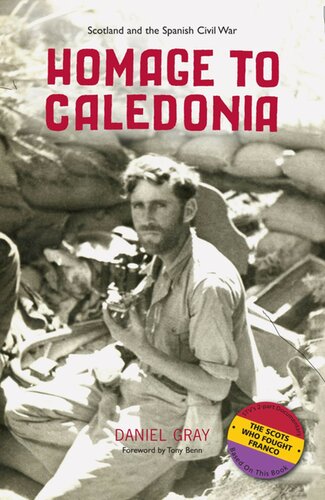

Most ebook files are in PDF format, so you can easily read them using various software such as Foxit Reader or directly on the Google Chrome browser.
Some ebook files are released by publishers in other formats such as .awz, .mobi, .epub, .fb2, etc. You may need to install specific software to read these formats on mobile/PC, such as Calibre.
Please read the tutorial at this link: https://ebookbell.com/faq
We offer FREE conversion to the popular formats you request; however, this may take some time. Therefore, right after payment, please email us, and we will try to provide the service as quickly as possible.
For some exceptional file formats or broken links (if any), please refrain from opening any disputes. Instead, email us first, and we will try to assist within a maximum of 6 hours.
EbookBell Team

4.3
48 reviewsThe Spanish civil war was a call to arms for 2,300 British volunteers, of which over 500 were from Scotland. The first book of its kind, Homage to Caledonia examines Scotland's role in the conflict, detailing exactly why Scottish involvement was so profound. The book moves chronologically through events and places, firstly surveying the landscape in contemporary Scotland before describing volunteers' journeys to Spain, and then tracing their every involvement from arrival to homecoming (or not). There is also an account of the non-combative role, from fundraising for Spain and medical aid, to political manoeuvrings within the volatile Scottish left. Using a wealth of previously-unpublished letters sent back from the front as well as other archival items, Daniel Gray is able to tell little known stories of courage in conflict, and to call into question accepted versions of events such as the 'murder' of Bob Smillie, or the heroism of 'The Scots Scarlet Pimpernel'. Homage to Caledonia offers a very human take on events in Spain: for every tale of abject distress in a time of war, there is a tale of a Scottish volunteer urinating in his general's boots, knocking back a dram with Errol Flynn or appalling Spanish comrades with his pipe playing. For the first time, read the fascinating story of Caledonia's role in this seminal conflict.
Thirty-five thousand people from across the world volunteered to join the armed resistance in a war on fascism. More people, proportionately, went from Scotland than any other country, and the entire nation was gripped by the conflict. What drove so many ordinary Scots to volunreer in a foreign war? Their stories are powerfully and honestly told, often in their own words: the ordinary men and women who made their way to Spain over the Pyrenees when the UK government banned anyone from going to support either side; the nuses and ambulance personnel who discovered for themselves the horrors of modern warfare; and the people back home who defied their poverty to give generously to the Spanish republican cause. Even in war there are light-hearted moments: a Scottish volunteer drunkenly urinating in his general's boots, enduring the dark comedy of learning to shoot with sticks amidst a scarcity of rifles, or enjoying the surreal experience of raising a dram with Errol Flynn. They went from all over the country: Glasgow, Edinburgh. Aberdeen, Dundee, Fife and the Highlands, and they fought to save Scotland, and the world, from the growing threat of fascism.
As seen on STV Documentary 'The Scots Who Fought Franco' 'Daniel Gray has done a marvellous job in bringing together the stories of Scots volunteers - in [this] many-voiced, multi-layered book' —Scotland on Sunday
'...moving and thought-provoking.' —The Herald
'A new and fascinating contribution' —Scottish Review of Books
'Book of the week - Gray deserves applause for shining a light on a lesser-known aspect of the nation's character of which we should all be proud.' —Press & Journal
Daniel Gray graduated with a politics and history degree from Newcastle University where he focussed in particular on foreign intervention in the Spanish civil war. Daniel has researched Scotland s role in the Spanish Civil War since 2006, and lectured throughout Scotland on the topic. He has also written on the topic for Discover magazine and the Scotsman. He is currently employed as an archivist in the National Library of Scotland, working on 19th century literary manuscripts contained within the John Murray Archive and lives in Edinburgh.